What are the Best Fruits for Muscle Recovery? While many people focus on protein intake and rest as the primary components of muscle recovery, the role of nutrition extends far beyond just protein. In fact, incorporating a variety of nutrient-dense foods, particularly fruits, can provide a powerful boost to your body’s natural recovery processes.
Fruits are often overlooked in the realm of muscle recovery, but they offer a unique and potent combination of vitamins, minerals, antioxidants, and other beneficial compounds that can aid in reducing inflammation, combating oxidative stress, and supporting muscle repair and growth.
But it’s not just about relieving soreness – the right fruits can also help replenish essential electrolytes lost through sweat, provide carbohydrates to refuel depleted glycogen stores, and offer a host of other benefits that contribute to overall muscle recovery and performance.
In this article, we’ll explore the best fruits for muscle recovery, delving into the specific nutrients and compounds that make them so effective. We’ll also discuss how to incorporate these powerhouse fruits into your diet, whether through smoothies, juices, or simply enjoying them whole. Additionally, we’ll touch on other factors that influence muscle recovery, such as adequate protein intake, hydration, and rest.
So, whether you’re a seasoned athlete or simply someone looking to enhance your post-workout recovery, get ready to discover the delicious and nutritious world of fruits that can help you bounce back stronger, faster, and better prepared for your next physical challenge.
What makes a Fruit good for Muscle Recovery?
Before we look at best fruits for muscle recovery, we need to first find out what makes a fruit good for muscle recovery.
Whether you’re an avid athlete, a weekend warrior, or simply someone who enjoys an active lifestyle, muscle recovery is a crucial aspect of maintaining peak performance and preventing injuries. After a strenuous workout or physical activity, your muscles undergo microscopic damage, leading to soreness, inflammation, and fatigue. Proper recovery is essential to repair this damage, replenish energy stores, and prepare your body for the next challenge.
While fruits are often praised for their natural sweetness and refreshing flavors, their true power lies in the unique combination of nutrients and compounds that can aid in muscle recovery. To understand why certain fruits are particularly beneficial, it’s important to recognize the key players in the recovery process.
Protein for Muscle Repair and Growth
While fruits are not typically considered a significant source of protein, some fruits do contain small amounts of this essential macronutrient. Protein is crucial for repairing and rebuilding muscle fibers that are damaged during exercise, as well as supporting overall muscle growth and development.
Antioxidants for Reducing Inflammation and Oxidative Stress
Strenuous exercise can lead to an increase in free radicals and oxidative stress, which can contribute to muscle damage and inflammation. Fruits are rich in various antioxidants, such as vitamin C, vitamin E, and polyphenolic compounds, which help neutralize these free radicals and reduce inflammation, promoting faster recovery.
Electrolytes for Hydration and Muscle Function
During intense physical activity, the body loses electrolytes like potassium, sodium, and magnesium through sweat. These electrolytes play crucial roles in muscle function, hydration, and overall performance. Many fruits are excellent sources of electrolytes, helping to replenish what is lost during exercise and supporting proper muscle function.
Vitamins and Minerals for Various Recovery Processes
Fruits are packed with a wide range of vitamins and minerals that contribute to various aspects of muscle recovery. For example, vitamin C is essential for collagen production, which is important for repairing and rebuilding muscle tissue. Minerals like zinc and iron are involved in protein synthesis and energy production, both of which are critical for muscle recovery and growth.
In addition to these essential nutrients, fruits also contain various phytochemicals and plant compounds that can offer additional benefits for muscle recovery. For instance, some fruits are rich in anti-inflammatory compounds like anthocyanins and bromelain, which can help reduce muscle soreness and inflammation after exercise.
Best Fruits for Muscle Recovery
Now that we’ve explored the key nutrients and compounds that make a fruit beneficial for muscle recovery, let’s dive into the top fruits that excel in aiding this process. Here are the best fruits for muscle recovery and how they can help you bounce back stronger after intense physical activity.
| Fruit | Key Nutrients/Compounds | Benefits for Muscle Recovery |
|---|---|---|
| Tart Cherries | – Anthocyanins (antioxidants) – Anti-inflammatory compounds | – Reduce muscle soreness and inflammation – Combat oxidative stress |
| Watermelon | – L-citrulline (amino acid) – High water content | – Aids in muscle repair and growth – Supports hydration |
| Pineapple | – Bromelain (enzyme) – Vitamin C (antioxidant) | – Reduces inflammation – Promotes collagen production for tissue repair |
| Pomegranate | – Punicalagins (antioxidants) – Anti-inflammatory compounds | – Reduces muscle damage and soreness – Combats oxidative stress |
| Banana | – Potassium (electrolyte) – Carbohydrates | – Replenishes electrolytes lost through sweat – Refuels glycogen stores for energy |
1. Tart Cherries
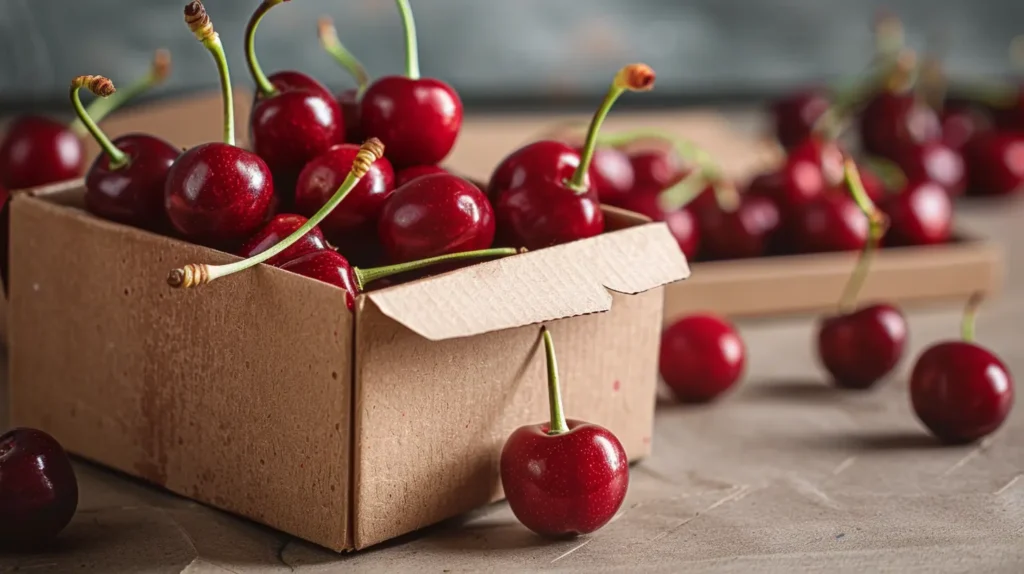
The first fruit on our list of best fruits for muscle recovery is Tart Cherries. Tart Cherry Juice is known for its ability to aid muscle recovery. This juice contains high levels of anthocyanins and polyphenolic compounds, which are powerful antioxidants. These nutrients help reduce inflammation and muscle soreness.
Research shows that drinking tart cherry juice can lower levels of creatine kinase (CK), a marker of muscle damage, and alleviate Exercise-Induced Muscle Damage (EIMD). Studies have noted a significant reduction in muscle soreness among athletes who consumed tart cherry juice before and after intense workouts.
Key Benefits:
- Reduces muscle soreness
- Lowers CK levels
- Decreases EIMD
For optimal results, it is recommended to drink one to two servings of tart cherry juice per day. A serving size typically ranges from 8 to 12 ounces. Consuming the juice both before and after exercise can maximize its benefits for muscle recovery.
2. Watermelon
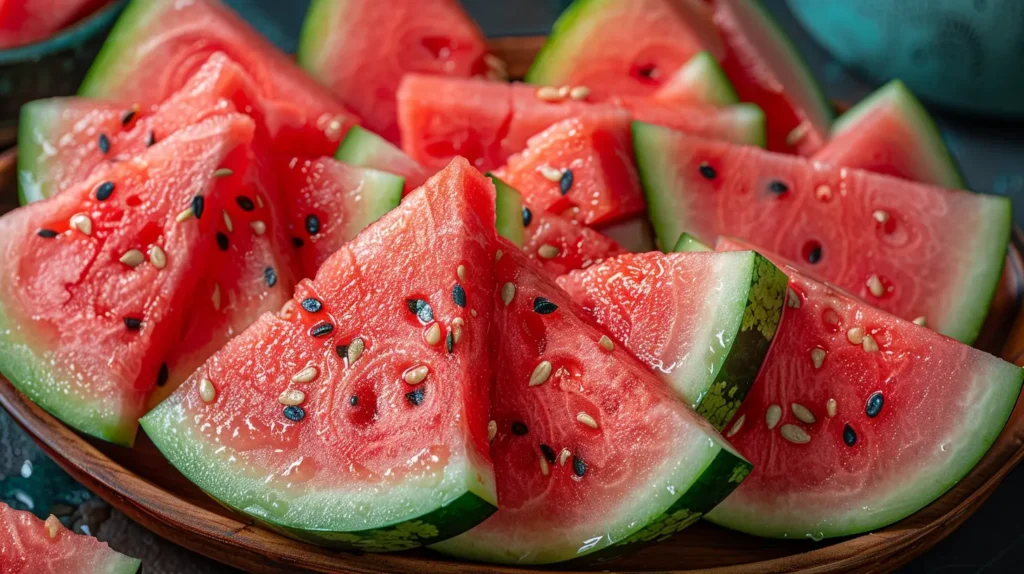
The second fruit on our list of best fruits for muscle recovery is Tart Cherries. Watermelon is a hydrating and nutrient-dense fruit that can aid in muscle recovery. It is rich in the amino acid L-citrulline, which helps increase nitric oxide production in the body. Nitric oxide enhances blood flow and oxygen delivery to the muscles, supporting muscle repair and growth.
Watermelon is also an excellent source of water and electrolytes like potassium, which can help replenish fluids and minerals lost during exercise.
Key Nutrients and Benefits
- L-citrulline: This amino acid found in watermelon helps improve blood flow and reduce muscle soreness.
- Hydration: Watermelon has a high water content, making it great for staying hydrated, which is important for muscle recovery.
Several studies have shown that watermelon or L-citrulline supplementation can help reduce muscle soreness and exercise-induced muscle damage. In one study, athletes who drank watermelon juice had less muscle soreness 24 hours after exercise compared to those who didn’t.
How to Consume
There are many ways to enjoy watermelon:
- Eat fresh slices as a post-workout snack.
- Blend it into smoothies for a hydrating and nutrient-packed drink.
- Pair it with other recovery foods like Greek yogurt or cottage cheese for added protein.
3. Pomegranate Juice
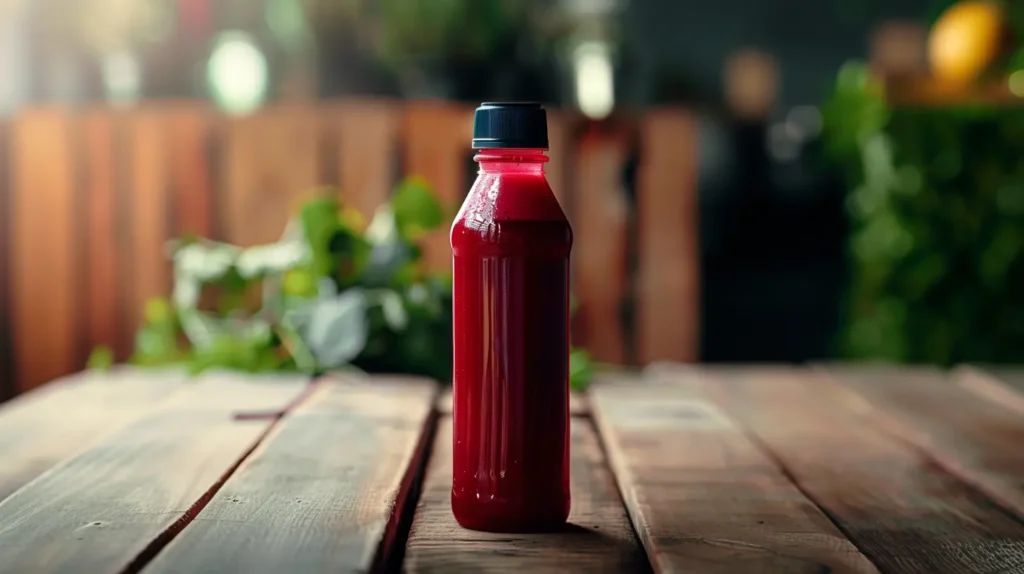
Next on our list of best fruits for muscle recovery is Pomegranate Juice. Pomegranate juice is a great choice for muscle recovery because it is full of antioxidants. These antioxidants, called polyphenols, have many health benefits, including reducing oxidative stress and inflammation.
How It Helps with Muscle Recovery
The polyphenols in pomegranate juice have been shown to have a big impact on oxidative stress markers like MDA (malondialdehyde). When oxidative stress is reduced, inflammation levels in the muscles also go down, which helps speed up recovery. The antioxidants in the juice work by stopping free radicals from causing harm to cells during intense workouts.
Numerous studies have highlighted the advantages of pomegranate juice for muscle recovery:
- One study discovered that athletes who drank pomegranate juice experienced less muscle soreness and had lower markers of muscle damage.
- Another research indicated that the polyphenolic content in pomegranate juice helps decrease inflammation and oxidative stress in muscles after exercise.
Regularly including pomegranate juice in your post-workout routine can be a smart move, as it makes use of its natural compounds to improve recovery and minimize muscle damage.
4. Blueberries and Raspberries
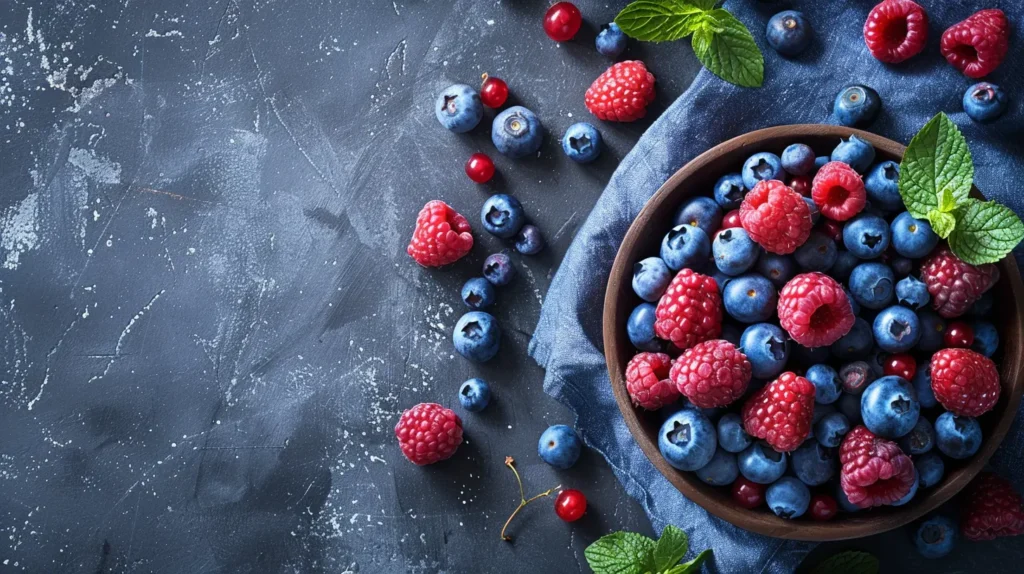
Blueberries and raspberries are packed with nutrients that can help your muscles recover after a workout. These berries are full of antioxidants, carbs, and other important nutrients that your body needs to heal.
How These Nutrients Work Together
Here’s how the different nutrients in blueberries and raspberries can benefit your post-workout recovery:
- Antioxidants: Blueberries and raspberries have lots of antioxidants, which can help fight off the damage caused by intense exercise.
- Carbohydrates: These fruits give you a quick burst of energy to restore the carbs you burned during your workout.
- Other Key Nutrients: Vitamins C and K, fiber, and manganese in these berries all contribute to keeping your muscles healthy.
The Power of Sirtuins for Your Muscles
Sirtuins are a special group of compounds found in high amounts in berries, and they play an important role in muscle health. Here’s what sirtuins can do:
- Aid in repairing damaged cells
- Improve how your mitochondria (the powerhouses of your cells) work
- Reduce swelling and soreness in your muscles
Research suggests that sirtuins might help speed up muscle recovery by helping your body use energy more efficiently and lowering markers of muscle damage.
Adding blueberries and raspberries to your meals or snacks is an easy way to get these benefits and support your body’s healing process after exercise.
5. Pineapple
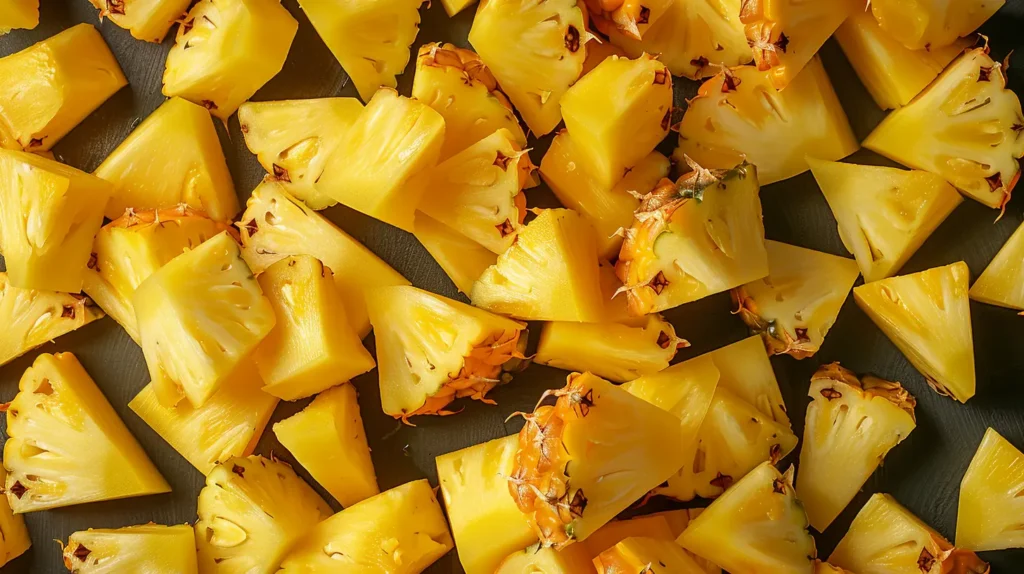
Pineapple contains bromelain, a proteolytic enzyme with potent anti-inflammatory properties. Bromelain can help reduce inflammation and muscle soreness caused by intense exercise.
Additionally, pineapple is a good source of vitamin C, an antioxidant that helps combat oxidative stress and supports collagen production for tissue repair.
Key Benefits:
- Reduces inflammation and muscle soreness (due to bromelain)
- Combats oxidative stress (vitamin C)
- Supports tissue repair (vitamin C)
Consuming fresh pineapple or pineapple juice after workouts can aid in the muscle recovery process.
6. Banana
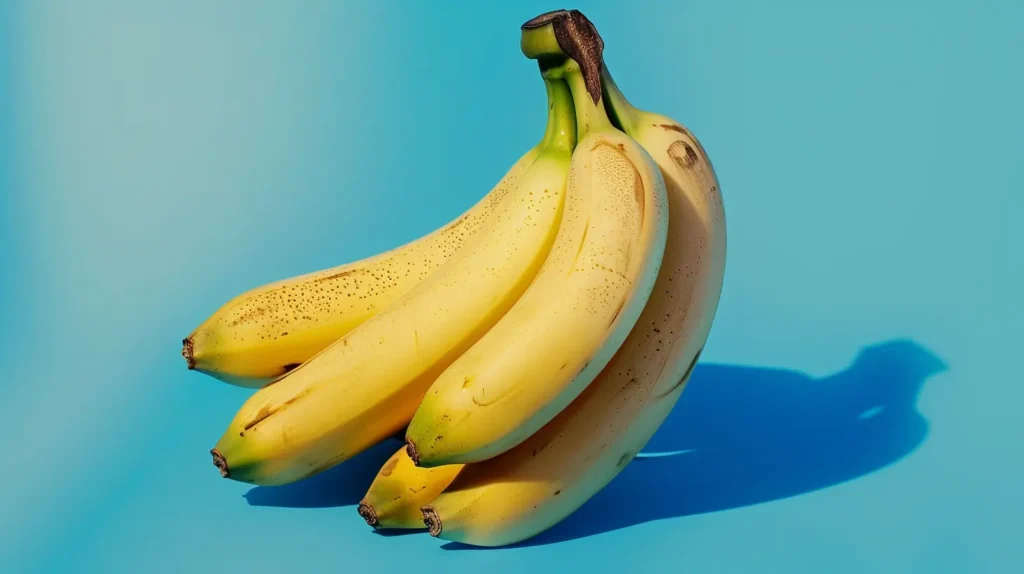
The last fruit on our list of best fruits for muscle recovery is Bananas. Bananas are an excellent source of potassium, an electrolyte that is lost through sweat during exercise. Replenishing potassium levels can help prevent muscle cramps and support proper muscle function.
Bananas also provide carbohydrates, which can help replenish glycogen stores in the muscles, providing energy for recovery and future workouts.
Key Benefits:
- Replenishes potassium levels (prevents cramps, supports muscle function)
- Provides carbohydrates for glycogen replenishment
Consuming a banana or two after a workout can help replace lost electrolytes and provide energy for muscle recovery.
Take Action
Don’t let muscle soreness and fatigue hold you back. Start incorporating these best fruits for muscle recovery into your diet today and experience the benefits of faster, more effective muscle recovery. Whether you enjoy them as a refreshing snack, blend them into a smoothie, or drink them as juice, these fruits can help you bounce back stronger and ready for your next workout. Embrace the power of nature’s best and take your recovery to the next level.
Today we talked about the best fruits for muscle recovery. Here are some other articles that you might like:
What are the Best Fruits to avoid for Weight Loss?
What are the Best Cereal for Weight Loss?
The Best Period Comfort Food: Feel Better Instantly
What are the Best Fruits for Muscle Gain?
ADHD Comfort Food: Try These Now!


